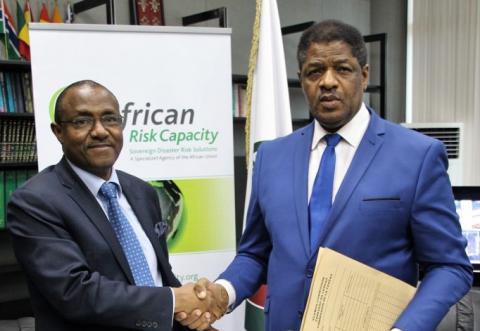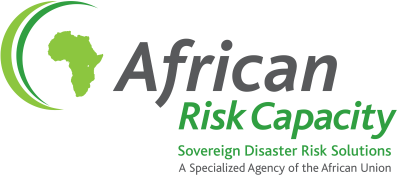
ABUJA, Nigeria, 8 November 2017 - The African Risk Capacity (ARC) and the Economic Community of West African States (ECOWAS) are collaborating more closely to build resilience against climate-related disasters in West Africa.
As global climate negotiations are underway at the 23rd United Nations Climate Change Convention in Germany, ARC and ECOWAS are taking a significant step to strengthen their partnership and amplify the impact of their work in disaster risk management, ensuring that the increasing risks of weather-related perils are addressed earlier and more effectively.
The signing of the Memorandum of Understanding between both institutions took place on the margins of the ECOWAS Annual Development Partners Meeting in Abuja, Nigeria, setting a course for closer collaboration on political, technical, and financial grounds. The partnership with ARC aligns with critical aspects of the ECOWAS Policy for Disaster Risk Reduction, with particular emphasis on the linkages with regional Agricultural Policy and climate change adaptation initiatives of ECOWAS.
[caption id="attachment_2100" align="aligncenter" width="3753"] ARC Director General Mohamd Beavogui and ECOWAS President Marcel de Souza signing the Memorandum of Understanding. Photo: African Risk Capacity[/caption]
Through this partnership, ECOWAS will further heighten awareness among West African nations of ARC’s work in assisting governments prepare for and respond to disasters effectively. The advocacy will be matched with an exchange of knowledge, data, and methodologies of early warning and climate risk financing mechanisms between ECOWAS and ARC. It will also include exploring innovative methods to use Africa RiskView, ARC’s early warning software to drive earlier response to disasters and assisting West African nations to access funding to join ARC’s insurance risk pool.
Mr. Mohamed Béavogui, Director General of ARC stated “ARC has a strong history in West Africa – of the 15 ECOWAS Member States, 14 have signed the ARC Establishment Agreement. In 2015, when ARC launched its first climate insurance risk pool, Senegal and Niger held drought insurance policies with ARC and received pay-outs of US $20 million collectively following the failed rains of 2014. Increasingly climate risks are a driver of security concerns in West Africa and this partnership is geared toward building our resilience but also ensuring that by responding earlier, such security risks are diminished”.
Earlier this year, ARC held a regional Lessons Learned workshop in Ouagadougou, Burkina Faso to take stock of the rich experiences of West African governments in working with ARC and launching disaster risk financing initiatives. In this workshop, ARC Member States recommended that ARC align more closely with regional disaster reduction and resilience-building programmes.
"This partnership between ECOWAS and ARC is a positive step for ECOWAS Member States" said Mr. Béavogui.
ARC Director General Mohamd Beavogui and ECOWAS President Marcel de Souza signing the Memorandum of Understanding. Photo: African Risk Capacity[/caption]
Through this partnership, ECOWAS will further heighten awareness among West African nations of ARC’s work in assisting governments prepare for and respond to disasters effectively. The advocacy will be matched with an exchange of knowledge, data, and methodologies of early warning and climate risk financing mechanisms between ECOWAS and ARC. It will also include exploring innovative methods to use Africa RiskView, ARC’s early warning software to drive earlier response to disasters and assisting West African nations to access funding to join ARC’s insurance risk pool.
Mr. Mohamed Béavogui, Director General of ARC stated “ARC has a strong history in West Africa – of the 15 ECOWAS Member States, 14 have signed the ARC Establishment Agreement. In 2015, when ARC launched its first climate insurance risk pool, Senegal and Niger held drought insurance policies with ARC and received pay-outs of US $20 million collectively following the failed rains of 2014. Increasingly climate risks are a driver of security concerns in West Africa and this partnership is geared toward building our resilience but also ensuring that by responding earlier, such security risks are diminished”.
Earlier this year, ARC held a regional Lessons Learned workshop in Ouagadougou, Burkina Faso to take stock of the rich experiences of West African governments in working with ARC and launching disaster risk financing initiatives. In this workshop, ARC Member States recommended that ARC align more closely with regional disaster reduction and resilience-building programmes.
"This partnership between ECOWAS and ARC is a positive step for ECOWAS Member States" said Mr. Béavogui.
 ARC Director General Mohamd Beavogui and ECOWAS President Marcel de Souza signing the Memorandum of Understanding. Photo: African Risk Capacity[/caption]
Through this partnership, ECOWAS will further heighten awareness among West African nations of ARC’s work in assisting governments prepare for and respond to disasters effectively. The advocacy will be matched with an exchange of knowledge, data, and methodologies of early warning and climate risk financing mechanisms between ECOWAS and ARC. It will also include exploring innovative methods to use Africa RiskView, ARC’s early warning software to drive earlier response to disasters and assisting West African nations to access funding to join ARC’s insurance risk pool.
Mr. Mohamed Béavogui, Director General of ARC stated “ARC has a strong history in West Africa – of the 15 ECOWAS Member States, 14 have signed the ARC Establishment Agreement. In 2015, when ARC launched its first climate insurance risk pool, Senegal and Niger held drought insurance policies with ARC and received pay-outs of US $20 million collectively following the failed rains of 2014. Increasingly climate risks are a driver of security concerns in West Africa and this partnership is geared toward building our resilience but also ensuring that by responding earlier, such security risks are diminished”.
Earlier this year, ARC held a regional Lessons Learned workshop in Ouagadougou, Burkina Faso to take stock of the rich experiences of West African governments in working with ARC and launching disaster risk financing initiatives. In this workshop, ARC Member States recommended that ARC align more closely with regional disaster reduction and resilience-building programmes.
"This partnership between ECOWAS and ARC is a positive step for ECOWAS Member States" said Mr. Béavogui.
ARC Director General Mohamd Beavogui and ECOWAS President Marcel de Souza signing the Memorandum of Understanding. Photo: African Risk Capacity[/caption]
Through this partnership, ECOWAS will further heighten awareness among West African nations of ARC’s work in assisting governments prepare for and respond to disasters effectively. The advocacy will be matched with an exchange of knowledge, data, and methodologies of early warning and climate risk financing mechanisms between ECOWAS and ARC. It will also include exploring innovative methods to use Africa RiskView, ARC’s early warning software to drive earlier response to disasters and assisting West African nations to access funding to join ARC’s insurance risk pool.
Mr. Mohamed Béavogui, Director General of ARC stated “ARC has a strong history in West Africa – of the 15 ECOWAS Member States, 14 have signed the ARC Establishment Agreement. In 2015, when ARC launched its first climate insurance risk pool, Senegal and Niger held drought insurance policies with ARC and received pay-outs of US $20 million collectively following the failed rains of 2014. Increasingly climate risks are a driver of security concerns in West Africa and this partnership is geared toward building our resilience but also ensuring that by responding earlier, such security risks are diminished”.
Earlier this year, ARC held a regional Lessons Learned workshop in Ouagadougou, Burkina Faso to take stock of the rich experiences of West African governments in working with ARC and launching disaster risk financing initiatives. In this workshop, ARC Member States recommended that ARC align more closely with regional disaster reduction and resilience-building programmes.
"This partnership between ECOWAS and ARC is a positive step for ECOWAS Member States" said Mr. Béavogui.
***
About African Risk Capacity (ARC) ARC was established in 2012 as a Specialised Agency of the African Union to help Member States better plan, prepare and respond to weather-related disasters. ARC works with countries to reduce the risk of loss and damage caused by extreme weather events affecting Africa’s populations by providing sovereign disaster risk insurance and other support, including capacity building, contingency planning, and access to early-warning technology. ARC plays an important role in responding to countries’ needs at times of crisis by providing fast access to funding for pre-agreed-upon, rapid response plans developed in conjunction with governments. ARC’s financing complements other forms of local and international support. In just the few years since ARC began, it has proven to be an effective and vital model – paying out USD $34 million to four countries (Senegal, Niger, Mauritania, and Malawi) affected by drought events. These resources provided assistance for over two million people and approximately one million cattle. ARC’s efforts are supported by donor partners who have contributed through grants or concessional loans. These include UK Department for International Development (DfID), Swiss Agency for Development and Cooperation (SDC), Swedish International Development Cooperation Agency (SIDA), United State Agency for International Development (USAID), The Rockefeller Foundation, Germany through KFW on behalf of BMZ, Global Affairs Canada and France. For more information, please visit: www.africanriskcapacity.org




